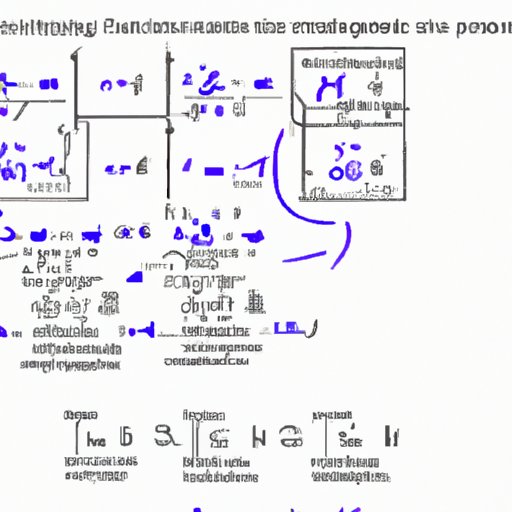Introduction
Mathematics and science have a long and intertwined history. From early astronomers mapping the night sky to modern physicists exploring the structure of the universe, math has been essential to advancing our understanding of the world around us. But just how is math used in science? In this article, we will explore the various ways in which mathematics is used in scientific research and the benefits it provides.

Exploring the Intersection of Math and Science: How Mathematics is Used in Scientific Research
One way in which mathematics is used in science is through the use of mathematical models. A mathematical model is a set of equations or algorithms that are used to describe and predict natural phenomena. Mathematical models provide scientists with an important tool for understanding and predicting the behavior of complex systems. They can be used to study physical systems such as the motion of planets, the spread of disease, or the behavior of fluids. They can also be used to analyze social systems such as the economy or population dynamics. By using mathematical models, scientists can gain insights into the underlying structure and behavior of complex systems.
Mathematics is also used in many other areas of scientific research. In physics, mathematics is used to understand the fundamental forces of nature and develop theories of matter and energy. In chemistry, mathematicians use equations to model chemical reactions and properties. In biology, mathematical models are used to study the behavior of cells, organisms, and populations. In economics, mathematics is used to analyze markets, understand consumer behavior, and make predictions about the future.
Applying Mathematics to Solve Real-World Problems in Science
In addition to being used to develop theories and models, mathematics can also be used to solve real-world problems in science. This includes problems such as predicting the behavior of a system, designing experiments, analyzing data, or optimizing processes. For example, mathematical optimization techniques can be used to find the most efficient route between two points or to minimize the cost of producing a product. Mathematical modeling can also be used to design new drugs or materials or to optimize the performance of a system.
The use of mathematics to solve real-world problems in science has several advantages. First, mathematics can be used to identify patterns and relationships that may not be obvious to the human eye. This can provide valuable insights into the behavior of a system. Second, mathematical models can be used to test hypotheses and make predictions about the future. Finally, mathematical models can be used to optimize processes or design new products or materials.

The Role of Mathematics in Understanding Natural Phenomena
Another way in which mathematics is used in science is to understand natural phenomena. Mathematics can be used to make predictions about the behavior of natural systems, such as the weather or climate change. For example, mathematical models can be used to predict the behavior of hurricanes or the movement of ocean currents. Mathematics can also be used to understand the behavior of animals and plants, or to simulate the behavior of ecosystems.
Mathematics can also be used to understand complex biological processes. By using mathematical models, scientists can gain insights into the behavior of cells, organisms, and populations. For example, mathematical models can be used to understand how cells communicate and interact with each other, or how genes control the development of an organism. Mathematical models can also be used to study the evolution of species or the spread of diseases within a population.
The Benefits of Using Mathematical Models in the Sciences
One of the main benefits of using mathematical models in the sciences is that they allow scientists to test and verify their theories. Mathematical models can be used to simulate real-world scenarios and test how a system will behave under different conditions. This allows scientists to refine their theories and gain a better understanding of the underlying structure of a system.
Another benefit of using mathematical models is that they can provide insights into the behavior of complex systems. By having a mathematical representation of a system, scientists can identify patterns and relationships that may not be obvious to the human eye. This can provide valuable insights into the behavior of a system and can help scientists develop more accurate theories and predictions.
Finally, mathematical models can be used to optimize processes or design new products or materials. By using mathematical models, scientists can determine the optimal solution to a problem or the most efficient way to produce a product. This can lead to significant cost savings and improved efficiency.
How Mathematics Is Used to Understand Complex Biological Processes
As mentioned before, mathematics can be used to understand complex biological processes. For example, mathematical models can be used to study the behavior of individual cells, the interactions between cells, or the spread of diseases within a population. Mathematical models can also be used to understand how genes control the development of an organism or how a species evolves over time.
The use of mathematics to understand complex biological processes has several advantages. First, mathematical models can provide insights into the behavior of cells, organisms, and populations that would otherwise be difficult to observe. Second, mathematical models can be used to test hypotheses and make predictions about the behavior of a system. Finally, mathematical models can be used to optimize processes or design new drugs or materials.
Conclusion
In conclusion, mathematics is an essential tool for advancing scientific knowledge and understanding the world around us. It can be used to develop theories, design experiments, analyze data, and optimize processes. It can also be used to make predictions about the behavior of natural systems and understand complex biological processes. The use of mathematics in science provides numerous benefits, including providing valuable insights into the behavior of complex systems and allowing scientists to test and refine their theories.

Final Thoughts on the Use of Mathematics in Science
At its core, mathematics is a powerful tool for understanding the world around us. From developing theories to solving real-world problems, mathematics is an invaluable tool for advancing scientific knowledge. As Albert Einstein famously said, “Pure mathematics is, in its way, the poetry of logical ideas.” With its ability to provide insights into the behavior of complex systems, mathematics is an essential part of scientific research.
(Note: Is this article not meeting your expectations? Do you have knowledge or insights to share? Unlock new opportunities and expand your reach by joining our authors team. Click Registration to join us and share your expertise with our readers.)
